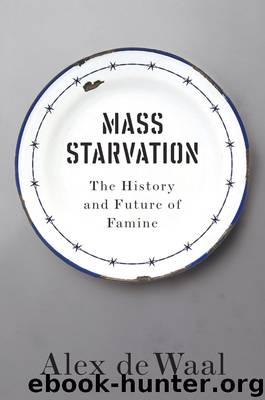Mass Starvation by de Waal Alex;

Author:de Waal, Alex;
Language: eng
Format: epub
Publisher: Polity Press
Published: 2017-12-25T16:00:00+00:00
Towards a global humanitarian norm
The arc of humanitarian history has bent towards saving lives in crises. The humanitarian system has many ragged edges, including misrepresentation and exaggeration, diversion and wastage and (most seriously) undermining the efforts of local people. Most important, however, is that the norm of prohibiting starvation became accepted by powerful democracies. This had real effects. Two incidents in the 1990s illuminate the shift: Iraq and North Korea.
The people of Iraq in the 1990s suffered a combination of the disruptions of the 1990 war and exceptionally severe comprehensive sanctions.18 The US Secretary of State, Madeleine Albright, asked for her opinion on a report that half a million children had died, said, ‘I think this is a very hard choice, but the price, we think the price is worth it.’19 She later regretted the statement: public opinion wouldn't any longer tolerate this kind of policy. Albright's regret was the tribute that realpolitik paid to the humanitarian norm. The Iraq sanctions controversy was part of a shift towards making it much more politically difficult for the United States to use the denial of food as a weapon.
When the first signs of famine in the People's Democratic Republic of Korea were apparent to the world in 1997, there was a vigorous debate in American newspaper columns between those who argued that it would be wrong to condition aid on policy change by the regime, notwithstanding its culpability for the famine, and those who implicitly made the case for starving North Korea into collapse, claiming that aid would be fungible and be used to support the military apparatus of a government hostile to its people and to America.20 Andrew Natsios was in the pro-aid group, and he concluded his review of that famine and relief efforts by observing that US aid helped make the regime more open to the international community. He also claimed that famines don't overturn dictatorships – generally true but with counter-examples, as in Ethiopia in 1974 and Sudan in 1985.
The sequel to the North Korean aid programme reveals how much the norm was shifting. Natsios took the principle of ‘no famine on my watch’ into the George W. Bush administration. He explained:
While I was USAID Administrator [from 2001–6] we, within the Agency, made it a policy that there would be no famines on our watch. I said this was the President's intention though I did not have a specific public document or statement I could quote. The President did say we would never use food as an instrument of diplomacy or deny it as a punitive measure while he was in office. We enforced his policy rigorously.21
Download
This site does not store any files on its server. We only index and link to content provided by other sites. Please contact the content providers to delete copyright contents if any and email us, we'll remove relevant links or contents immediately.
The Secret History by Donna Tartt(16621)
The Social Justice Warrior Handbook by Lisa De Pasquale(11489)
Thirteen Reasons Why by Jay Asher(7788)
This Is How You Lose Her by Junot Diaz(5769)
Weapons of Math Destruction by Cathy O'Neil(5036)
Zero to One by Peter Thiel(4824)
The Myth of the Strong Leader by Archie Brown(4789)
Promise Me, Dad by Joe Biden(4447)
Beartown by Fredrik Backman(4415)
Stone's Rules by Roger Stone(4415)
How Democracies Die by Steven Levitsky & Daniel Ziblatt(4398)
The Fire Next Time by James Baldwin(4342)
100 Deadly Skills by Clint Emerson(4076)
A Higher Loyalty: Truth, Lies, and Leadership by James Comey(4032)
Rise and Kill First by Ronen Bergman(4012)
The David Icke Guide to the Global Conspiracy (and how to end it) by David Icke(3881)
The Farm by Tom Rob Smith(3872)
Secrecy World by Jake Bernstein(3782)
The Doomsday Machine by Daniel Ellsberg(3730)
